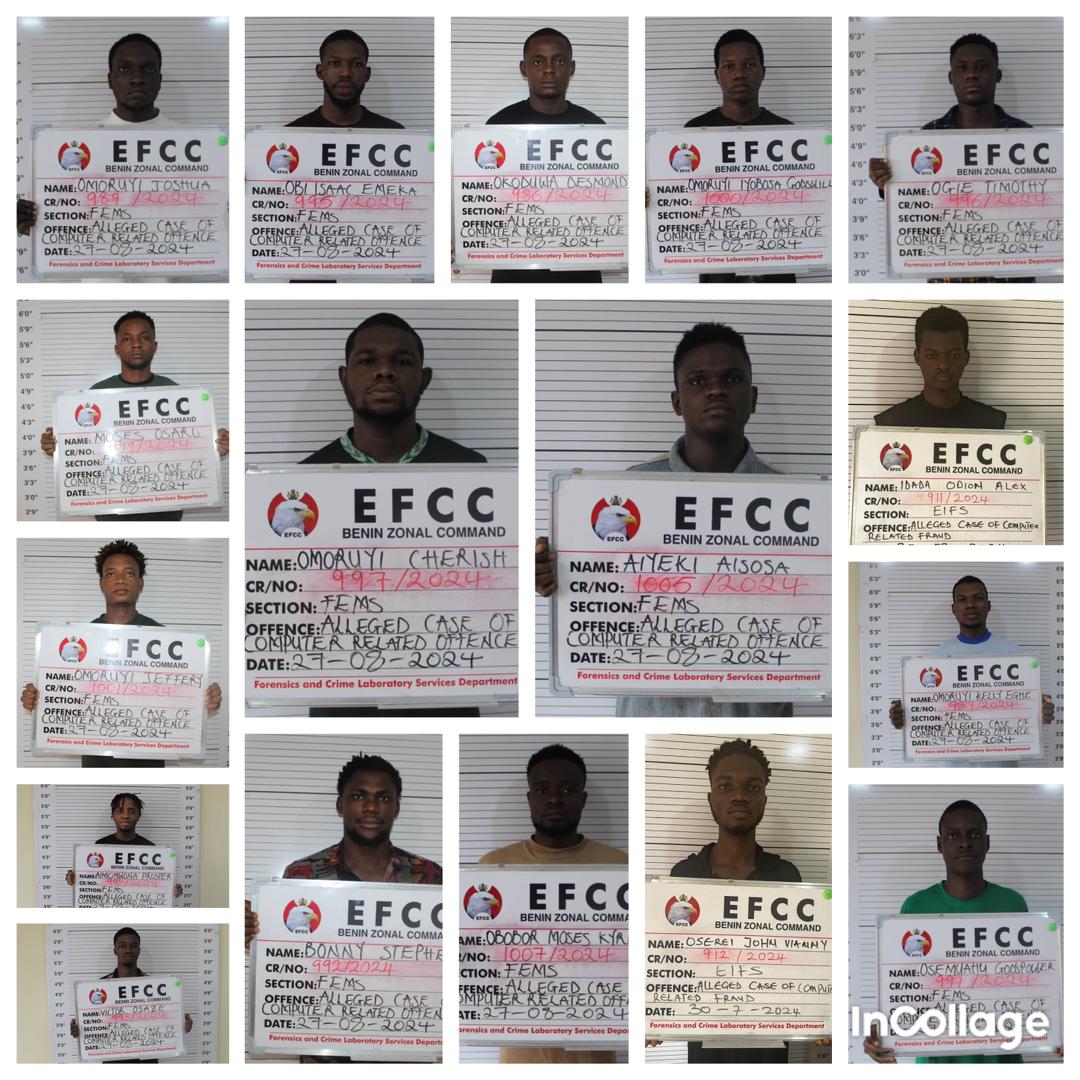In a landmark ruling, the Economic and Financial Crimes Commission (EFCC) successfully prosecuted 17 individuals involved in internet fraud in Benin City. Justice Igho Braimoh of the Edo State High Court delivered the verdict, convicting the fraudsters of various charges relating to internet fraud. The convicts were handed prison sentences ranging from two to three years, with an option of fines, in accordance with the provisions of the Advance Fee Fraud and Other Fraud Related Offences Act 2006.
Among the convicted individuals are Oserei John Vianny, Osaro Moses, Desmond Okoduwa, Obi Isaac, Joshua Omoruyi, Iyabosa Omoruyi, and others. They were charged with offences related to obtaining by false pretence and possession of fraudulent documents, to which they all pleaded guilty. Their sentencing marks another significant victory in EFCC’s ongoing efforts to tackle cybercrime in Nigeria.
Guilty Pleas and Sentencing
When the charges were read in court, all 17 defendants pleaded guilty to the allegations of internet fraud, which primarily involved obtaining by false pretence and possession of fraudulent documents. The prosecution, led by counsel I.K. Agwai, Ibrahim Faisal, and Ahmed Salihu, urged the court to proceed with sentencing based on the defendants’ admission of guilt. Their charges fell under sections 6 and 8(b) of the Advance Fee Fraud and Other Fraud Related Offences Act 2006, which punishes fraudulent activities related to advance fee fraud.
Justice Igho Braimoh sentenced several of the convicts to two years in prison or the payment of a N200,000 fine, including Oserei John Vianny, Osaro Moses, and others. Some, including Iyabosa Omoruyi, Joshua Omoruyi, and Prosper Aimiomwona, were sentenced to three years in prison or a fine of N200,000. Desmond Okoduwa received the highest penalty, with three years imprisonment or a fine of N500,000. The judge tempered justice with leniency, granting the option of fines after pleas from the defense counsel for mercy, as the defendants expressed remorse for their crimes.
Asset Forfeiture and Other Penalties
In addition to their prison sentences and fines, the court ordered the forfeiture of assets obtained through fraudulent activities. This included luxury vehicles such as a Toyota Camry, Mercedes Benz 350, Toyota RAV4, and a Mercedes Benz C300, which were recovered from convicts Desmond Okoduwa, Obi Isaac, and Aisosa Aiyeki. These assets were deemed proceeds of their illicit activities and were forfeited to the federal government as part of the court’s ruling.
Further penalties included the forfeiture of the convicts’ mobile phones, laptops, and funds in their bank accounts, which were also linked to the fraudulent schemes. The convicts were additionally required to sign written undertakings, committing to good behaviour and staying away from fraudulent activities in the future. Their journey to imprisonment began with their arrest by the EFCC’s Benin Zonal Directorate, which had acted on credible intelligence regarding their involvement in internet fraud.
EFCC’s Fight Against Internet Fraud
This conviction underscores the EFCC’s ongoing efforts to clamp down on cybercriminals across Nigeria, especially in states like Edo, where internet fraud has been prevalent. The Benin Zonal Directorate of the EFCC has been particularly active, with numerous arrests and convictions of individuals involved in cybercrime in recent years. Their successful prosecution of these 17 individuals further demonstrates the agency’s commitment to eradicating internet fraud and other financial crimes in the region.
The case highlights the growing need for vigilance and robust legal action to deter internet fraud, which has tarnished Nigeria’s image globally. The EFCC’s strategic use of intelligence gathering, arrest, and prosecution serves as a warning to those involved in internet fraud, reinforcing the message that such crimes will not go unpunished. Through this high-profile conviction, the EFCC hopes to continue curbing the rise of cybercrime and restoring integrity within Nigeria’s financial and digital landscape.
While EFCC Also Arrests 46 Suspected Internet Fraudsters in Warri
In a coordinated effort to combat cybercrime, operatives of the Benin Zonal Directorate of the Economic and Financial Crimes Commission (EFCC) arrested 46 suspected internet fraudsters in Warri, Delta State, on Sunday, September 8, 2024. The operation, carried out at various locations across Warri, followed credible intelligence reports on the suspects’ alleged involvement in internet-related fraud activities. According to EFCC sources, the arrests were part of a broader crackdown on cybercrime that has been plaguing Delta State in recent years.
The EFCC has been intensifying efforts to address the rising threat of internet fraud, commonly referred to as “Yahoo-Yahoo” in Nigeria. These operations are designed to dismantle networks of fraudsters who target individuals and businesses both locally and internationally. The EFCC’s focus on Warri underscores the region’s increasing prominence as a hub for cybercrime activities, driven by the vast number of young people turning to illicit online ventures.
Recovered Items and Legal Proceedings
During the arrest, EFCC operatives recovered a range of items from the suspects, including 13 exotic cars, laptops, and mobile phones, which are believed to have been used in carrying out fraudulent activities. The recovered items are expected to serve as key evidence in the prosecution of the suspects. The EFCC has indicated that these individuals are part of a larger network of fraudsters engaged in online scams, which include identity theft, phishing, and fraudulent business schemes.
The suspects are currently in EFCC custody and will be charged to court once investigations are completed. The agency has reassured the public that it remains committed to tackling cybercrime and ensuring that those involved are brought to justice. With the arrest of these 46 individuals, the EFCC has sent a strong message to others involved in internet fraud that they will be relentlessly pursued and prosecuted under Nigerian law. The crackdown on internet fraudsters is part of a broader national strategy to restore the country’s reputation and curb the growing menace of cybercrime.
Table of Contents
Discover more from OGM News NG
Subscribe to get the latest posts sent to your email.














